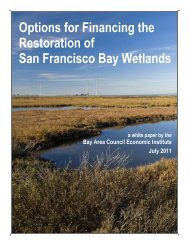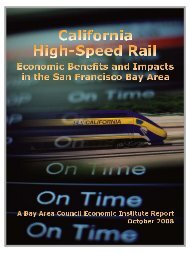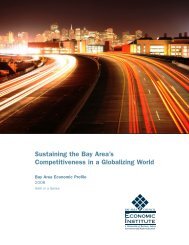Ties That Bind - Bay Area Council Economic Institute
Ties That Bind - Bay Area Council Economic Institute
Ties That Bind - Bay Area Council Economic Institute
You also want an ePaper? Increase the reach of your titles
YUMPU automatically turns print PDFs into web optimized ePapers that Google loves.
Investment: Building Global Businesses in a New China<br />
SASAC implemented an administrative order of the State<br />
<strong>Council</strong> to rotate the chairmen, chief executive officers, and<br />
other top executives of China’s four major telecom operators,<br />
side-stepping their “independent” boards of directors entirely.<br />
SASAC directs critical financial resources, appoints top managers,<br />
implements major state directives such as the “going<br />
global” campaign, and oversees restructuring of major players<br />
in the pillar sectors.<br />
Reverse engineering, counterfeiting, outright IP theft and<br />
other forms of IP misappropriation are widespread in<br />
China. Several factors contribute to this, beginning with a deeprooted<br />
ideological and social tenet that shared property takes<br />
precedence over private property. Provincial and local governments<br />
enjoy broad economic and legal autonomy to act to the<br />
“economic benefit” of their citizens. Aggressive local economic<br />
development initiatives often ignore or encourage IP abuses,<br />
beyond the central government’s enforcement reach. Global<br />
demand for low-cost products, coupled with highly efficient<br />
global distribution networks, favors the smooth flow of goods<br />
over customs IP enforcement in many import markets.<br />
The mixed motives of Chinese courts and law enforcement<br />
entities often result in outcomes unexpectedly adverse to<br />
the rights of IP owners. China’s courts have been receptive to<br />
legal challenges brought by Chinese companies and associations,<br />
arguing that foreign technology royalty agreements unfairly<br />
restricts the growth and competitiveness of Chinese domestic<br />
manufacturers. In general, the government has taken a<br />
view that maintaining political stability and increasing employment<br />
and living standards necessitates some tolerance toward<br />
illicit use of IP.<br />
High levels of IP transfer occur globally in many other<br />
ways that cannot be prevented by legal measures in any<br />
case. IP beyond patents, copyrighted material, trademarks and<br />
trade secrets are frequently transferred when skilled employees<br />
move from one company to another. Large numbers of retired<br />
technical specialists from U.S. and Europe find opportunities for<br />
second careers in China, passing on valuable scientific and<br />
engineering expertise to startups and established companies.<br />
Government funds and incentives support startups that in turn<br />
attract returning graduates and workers, as well as venture<br />
funding and expertise that value those startups’ government<br />
133








